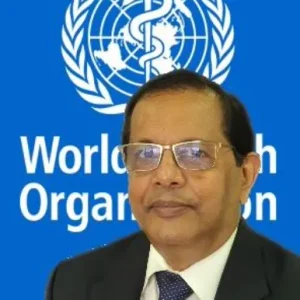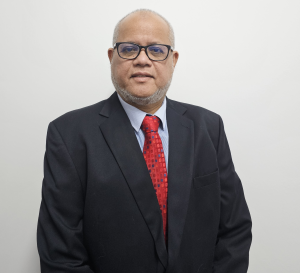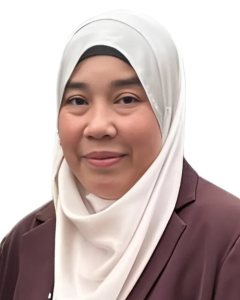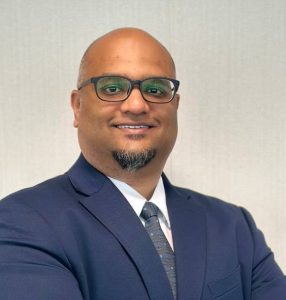12th National Public Health Conference
Plenaries
Plenary 1

Readiness and Integration of Artificial Intelligence (AI) in Public Health : Role of WHO for Western Pacific Countries
Dr. Rabindra Abeyasinghe
World Health Organization Representative & Head of the World Health Organization Country Office to Malaysia, Brunei Darussalam and Singapore
Synopsis – TBC
Speaker’s Biodata – Dr Rabi Abeyasinghe is the World Health Organization (WHO) Representative to Malaysia, Brunei Darussalam, and Singapore. Prior to this, he served as the WHO Representative to the Philippines and was Acting Director for Health Security and Emergencies at the WHO Regional Office for the Western Pacific (WPRO), where he supported the regional COVID-19 response. Since joining WHO in 2011, he has held several key roles, including Coordinator for Malaria, Other Vector-borne and Parasitic Diseases (2015–2019), Acting Director for Communicable Diseases (2018 and 2019), Regional Entomologist, and Technical Officer for Malaria in Papua New Guinea. Dr Rabi is a medical specialist with a medical degree in Community Medicine from the University of Colombo, Sri Lanka. He also holds an MSc in Biology and Control of Disease Vectors from the London School of Hygiene & Tropical Medicine and a Diploma in Tropical Medicine & Hygiene from the Royal College of Physicians, London. Before joining the WHO, he held senior roles in Sri Lanka’s Ministry of Health, including Director of the National Malaria Control Programme and Project Director for GFATM initiatives. He is a Fellow and former President of the College of Community Physicians of Sri Lanka.
Plenary 2

Diagnosis-Related Groups and Digitalisation in Public Health : The Building Blocks of Health Transformation
Professor Emeritus Dato’ Dr. Syed Mohamed Aljunid bin Syed Junid
Public Health Medicine Consultant; Professor of Health Economics, Policy and Management, Universiti Kebangsaan Malaysia; and Professor of Community Medicine, IMU University
Synopsis – The implementation of Diagnosis-Related Groups (DRGs) or casemix, represents a transformative shift in healthcare financing and service delivery, facilitating more efficient resource allocation and enhanced patient care. Public health services as the backbone of the health system will be involved in the planning and implementation of DRGs nationwide. This presentation begins with an overview of DRGs, clarifying how these systems group patients based on clinical characteristics and treatment requirements. This grouping not only aids in the precise categorisation of patients but also streamlines standardised reimbursement processes for healthcare providers. By analysing the interconnected roles of DRGs in improving operational efficiency and promoting value-based care, this paper equips public health professionals with the essential knowledge needed to navigate the complexities of DRG systems. Key components examined in depth include the coding process, costing methodology, casemix index, and the pivotal roles of clinicians in implementing DRGs effectively. In addition to outlining best practices for DRG implementation, this session addresses common challenges and barriers faced by healthcare professionals, such as data accuracy and the necessity for interdisciplinary collaboration. It also highlights the impact of these challenges on the successful adoption of DRGs. Ultimately, this presentation aims to empower public health professionals by providing practical insights and tools to leverage DRGs effectively, thereby improving patient outcomes and fostering more sustainable healthcare practices. By deepening their understanding of DRGs, public health specialists and professionals can better align their practices with emerging trends in healthcare financing and delivery, resulting in enhanced quality of care and operational performance.
Speaker’s Biodata – Professor Emeritus Dato’ Dr. Syed Mohamed Aljunid is a Public Health Medicine Consultant and Professor of Health Economics, Policy and Management at the Faculty of Medicine, Universiti Kebangsaan Malaysia (UKM). He also serves as Professor of Community Medicine at IMU University. He holds a PhD in Health Economics and Financing from the London School of Hygiene and Tropical Medicine, a medical degree from UKM, and an MSc in Public Health from the National University of Singapore. With over 34 years of experience in health policy, economics, and financing, he was the Founding Head of the International Centre for Casemix and Clinical Coding (UKM), and held senior roles at UNU International Institute for Global Health (UNU-IIGH) and Kuwait University. He has advised the World Health Organization, World Bank, Australian Agency for International Development (AusAID), The Deutsche Gesellschaft für Internationale Zusammenarbeit (GIZ), and The Asian Development Bank on Diagnosis-Related Groups (DRG)-based provider payment reforms in over 20 countries. He currently serves on Malaysia’s National Committee for DRG Implementation and MOH Technical Advisory Group. Dr Syed has published over 300 journal articles and reports, delivered more than 350 conference presentations, and has over 120,000 citations with an h-index of 79. He has supervised 46 PhD and over 200 Master’s students and is ranked in the top 2% of globally cited scientists by Stanford University in 2024.
Plenary 3

Integrating One Health Strategies for Emerging Infectious Disease in the Post-Pandemic Era
Dr. Noraryana binti Hassan
Director & Public Health Medicine Specialist, Disease Control Division, Ministry of Health Malaysia
Synopsis – Approximately 75% of Emerging Infectious Diseases (EIDs) are zoonotic in origin. Factors such as globalisation, environmental degradation, and closer human-animal interactions contribute significantly to this trend. The One Health approach—endorsed by the World Health Organization (WHO), Food and Agriculture Organization (FAO), World Organisation for Animal Health (WOAH), and United Nations Environment Programme (UNEP)—provides a comprehensive framework to address EIDs by integrating human, animal, and environmental health sectors. It promotes collaboration, coordination, and shared responsibility in disease prevention, detection, and response. Malaysia’s experience with several zoonotic and emerging infections highlights the value of One Health in practice. Notable case studies include the Nipah virus outbreak (1999), controlled through multisectoral culling and movement restrictions; SARS (2003) and MERS-CoV (2014), which prompted border health surveillance; avian influenza, which remains a concern for poultry health; the ongoing rabies outbreak in Sarawak (since 2017); and COVID-19, which served as a catalyst for strengthening digital surveillance (e.g., MySejahtera) and risk communication. These examples demonstrate how One Health principles have been applied to real-world crises in Malaysia. Despite growing political commitment and structural progress, several challenges hinder effective One Health implementation. These include collaboration across sectors, integration of surveillance data, funding constraints, policy enforcement, public awareness, and workforce capacity. Key strategies include disease prioritisation workshops, establishment of multisectoral committees, development of national plans, field simulation exercises, and enhanced digital surveillance. Efforts are also focused on embedding One Health into national policy frameworks and financing mechanisms. One Health is not merely a concept but a necessary operational model for managing current and future health threats. By institutionalizing collaboration, investing in capacity and digital tools, and aligning regional and national strategies, Malaysia is strengthening its resilience and setting a leadership example within ASEAN for sustainable health security in the post-pandemic era.
Speaker’s Biodata – Dr Noraryana is a Public Health Consultant with deep expertise in non-communicable disease (NCD) epidemiology. Her career spans decades of impactful work at the intersection of law and public health, particularly around tobacco control. She is also an alumnus of the prestigious McCabe Centre for Law and Cancer in Australia. Currently serves as Director of the Disease Control Division, Ministry of Health Malaysia. A highly respected figure in global tobacco control, Dr Noraryana has served as the Regional Coordinator for the Western Pacific Region under the WHO Framework Convention on Tobacco Control (FCTC) from 2021 to 2022. She continues this vital work today as a Bureau Member of the FCTC for the 2023 to 2025 term, representing the region with distinction on the international stage. Domestically, she played a pivotal role in the development and enactment of Act 852: The Control of Smoking Products for Public Health Act 2024, Malaysia’s first-ever standalone legislation dedicated to the control of smoking products. This groundbreaking law marks a major milestone in the nation’s tobacco control efforts. Dr Noraryana is also the mastermind behind the National Lung Health Initiative, an ambitious, integrated programme addressing prevention strategies across NCDs, infectious diseases, occupational health, and environmental pollution. Her leadership extended to the international level, where she and her NCD team successfully introduced a Global Resolution on Lung Health, garnering the support of 15 countries and multiple international agencies. Her commitment to holistic public health strategies continues through her involvement in the development of the Integrated Clinical Obesity Management framework, which will be aligned with Liver Hope, which is Malaysia’s national programme for liver cancer prevention. In recognition of her exceptional contributions, Dr Noraryana has received numerous accolades both at home and abroad. Most recently, she was honoured with the Joint Award for Tobacco Control, presented alongside the Honourable Minister of Health and the Malaysian Council for Tobacco Control, at the World Health Assembly in Geneva, May 2025.
Plenary 4

Public Health in the Digital Era: Prospects and Obstacles
Dr. Maheshwara Rao Appannan
Director of Digital Health Division, Ministry of Health Malaysia
Synopsis – Digital transformation is significantly reshaping public health practice globally, providing powerful tools to enhance surveillance, service delivery, health promotion, and policy planning. In Malaysia, the digital health agenda focuses on building a responsive, data-driven, and equitable public health system, evident through initiatives such as the expansion of telemedicine and interoperable electronic medical records. These digital tools aim to connect communities, strengthen healthcare integration, and improve health outcomes, supported by robust policy mechanisms for sustained innovation.
Effective use of integrated, real-time data for early detection, response, and planning—termed public health intelligence—requires advanced data governance frameworks. This encompasses data security, ethical use, and equitable access, ensuring digitalisation benefits all without widening disparities. However, challenges persist, including the fragmentation of data sources, interoperability constraints, and ownership concerns, which underscore the necessity for cohesive governance approaches.
Another crucial dimension is workforce transformation, where digital literacy and adaptation to technological changes remain essential. Additionally, the increased reliance on digital systems heightens vulnerability to cybersecurity threats, underscoring the importance of robust cybersecurity frameworks in protecting patient data and maintaining public trust.
Despite digitalisation’s promise, barriers such as infrastructure gaps, institutional resistance, and mismatched interventions impede progress. Addressing these requires multi-sectoral collaboration, coherent policy-making, and fostering a digital culture within public health. Malaysia’s journey demonstrates that digital transformation is fundamentally human-centred and culturally rooted, not merely technological, guiding the path toward a resilient, inclusive digital health ecosystem.
Speaker’s Biodata – Dr Maheshwara Rao Appannan is the Director of the Digital Health Division at the Ministry of Health Malaysia. He has over 17 years of experience in public health, infectious disease modelling, and digital innovation. He holds a Doctorate and a Master’s degree in public health from Universiti Malaya and has received advanced training from the Centers for Disease Control and Prevention (CDC) Atlanta and Harvard Medical School. A pioneer in Malaysia’s digital health landscape, Dr Maheshwara was the head of data during the COVID-19 pandemic. He led the development of the MySejahtera app and spearheaded efforts to make COVID-19 data publicly accessible via GitHub and the COVIDNow platform. His leadership has driven rapid digital transformation in public healthcare, including implementing a cloud-based clinic management system in 50 clinics within eight weeks. This led to increased funding for nationwide digitalisation. He continues to drive innovations in digitising manual healthcare services such as organ donation pledges, appointments, and disease care plans. In 2024, he successfully launched Malaysia’s implementation of the International Patient Summary (IPS) and actively champions the ‘1 Citizen 1 Record’ initiative, aiming for a unified health record for all Malaysians.



